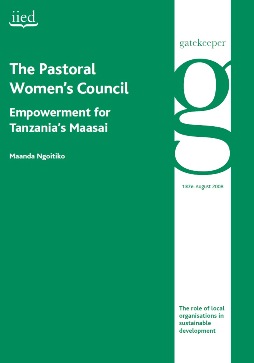Resource information
The Pastoral Women’s Council (PWC) is a community-based organisation established in 1997 in Tanzania. It was founded to promote the development of Maasai pastoralist women and children by facilitating their access to education, health, social services and economic empowerment. It seeks to address women’s marginalisation in patriarchal Maasai culture, as well as the poverty among the Maasai that has long been underpinned by land access restrictions for pastoralists, hunters and gatherers. PWC’s concerns include preventing the loss of land to the national promotion of tourism, conservation and large-scale commercial farming. Maasai pastoralist women lack property ownership rights, access to social services and the power to make decisions about their own lives (e.g. marriage, education, access to health services). A movement in the 1990s brought about many rights and improved livelihood benefits for pastoralists, but often neglected the gender inequalities and injustices prevalent in Maasai society.
PWC has created and facilitated the formation of women’s action groups and has organised local fundraising for its credit programme. It provides Maasai girls and women with opportunities for education as well as a revolving livestock programme. It has established a small-scale agricultural development programme and it promotes women’s rights and leadership by raising women’s awareness and critical understanding of politics, legislation, women’s rights and their role in development (e.g. through paralegal training, studies, talks by experienced guest speakers, meetings, and encouraging women to talk openly). Its approach is to empower indigenous communities to secure their access and rights to natural resources and to have their role in the management of these resources recognised. Thus, PWC has not only improved tangible aspects of Maasai people’s lives, it has also helped women gain confidence, skills, knowledge and respect.
You can download this publication from the International Institute for Environment and Development's (IIED) website.

